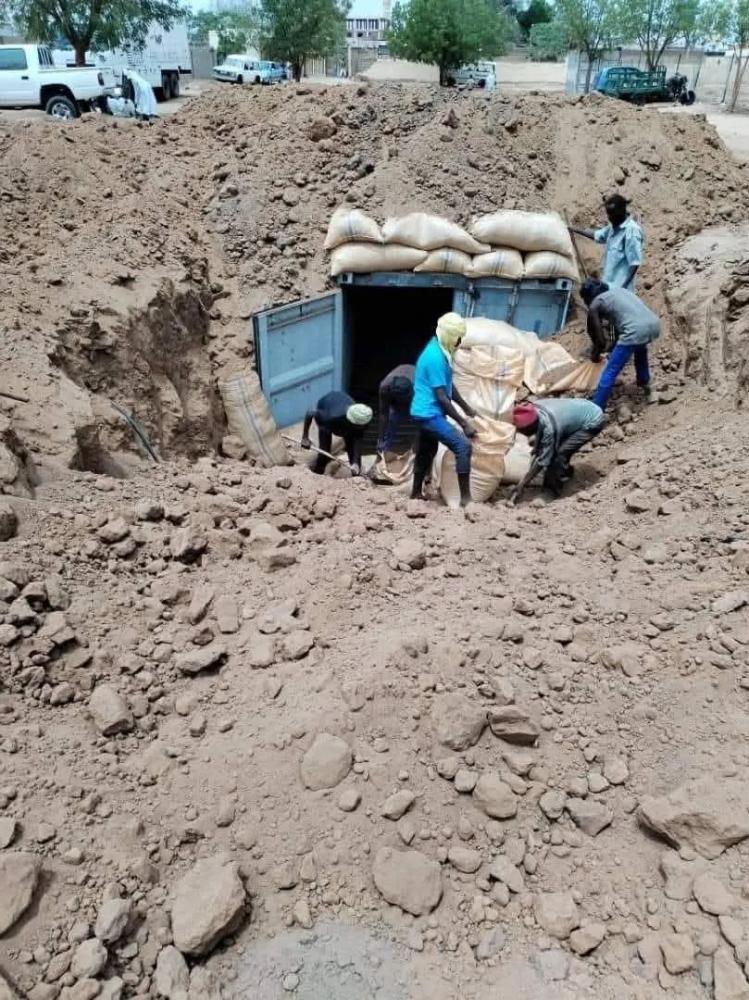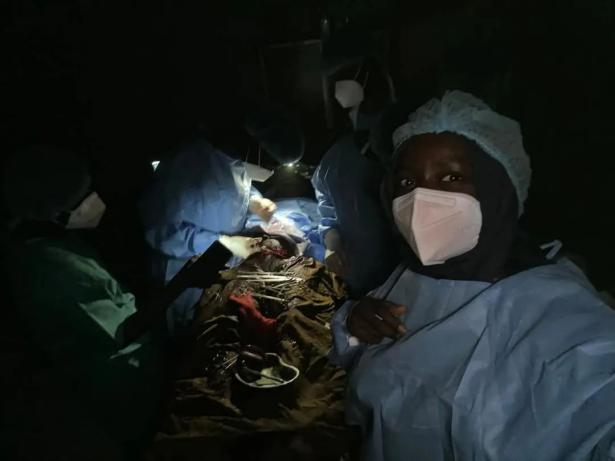In a dimly lit makeshift emergency room buried beneath the ground in the besieged town of El-Fasher in western Sudan, gynecologist Elaf Mohamed tends to her third patient of the day. The thundering boom of an explosion shakes the earth as another missile smashes into the surface above.
“We perform surgeries, sometimes up to 12 procedures a day, in these underground shelters,” Dr. Elaf told Drop Site News by phone. “We carry out emergency operations on women with gunshot or shell injuries, as well as caesarian sections, all while being severely short of medical equipment.”
Shelling by the Rapid Support Forces (RSF) over El-Fasher has intensified in recent weeks as the paramilitary group pushes to capture the capital of North Darfur from the Sudanese National Army (SNA). Nearly two years of fighting in a bitter power struggle between the SNA and RSF that erupted in April 2023 has brought Sudan to the brink of collapse. The conflict has triggered the largest displacement crisis in the world, with more than 14 million people uprooted from their homes, tens of thousands killed, and the country’s civilian infrastructure devastated. Famine is sweeping parts of the country with over 750,000 people on the brink of starvation.
El-Fasher, home to nearly one million people, has swelled by over 700,000 internally-displaced people fleeing violence elsewhere. Since May, the city has been under siege by the RSF, with paramilitary forces launching indiscriminate attacks, killing hundreds of civilians, and systematically targeting hospitals and medical facilities.
The city’s only functional public hospital — the Al-Saudi Maternal Teaching Hospital, which provides surgical and reproductive health services — has been attacked 15 times over the course of the conflict. Last week, on January 24, a drone attack on the hospital’s emergency department blamed by local officials on the RSF killed over 70 people. The attack came days after a 48-hour ultimatum issued by the RSF to forces allied to the SNA to vacate the city.
The indiscriminate violence has forced Dr. Elaf and her colleagues into underground emergency rooms constructed a short distance from the al-Saudi hospital. Poorly equipped and lit only with flashlights, the buried hideouts-turned-ERs have become the only safe locations for medics to provide much needed healthcare in the face of continuous shelling of the city.
“The shelling is non-stop, and even during operations we can hear the sound of shells falling,” Dr. Elaf told Drop Site, adding that 20 out of 28 public medical facilities in El-Fasher have been rendered inoperative by the conflict. The dangers to patients and medical staff have only increased as the fighting intensifies. “I was once shot in the leg while working inside the hospital,” Dr. Elaf said.
The underground medical bunkers were built in June, one month into RSF’s siege of El-Fasher, by a group of volunteers, according to Hawaa Dawood, a member of the group. “They were set up after all the main hospitals in the city were attacked, leaving only one out of the three main hospitals operative, and that one only partially," Dawood told Drop Site.
Dawood said the underground rooms were created out of shipping containers left behind at the headquarters of UNAMID, the joint UN and African Union peacekeeping body set up in the years following the outbreak of the Sudanese civil war in 2003. UNAMID completed its mandate in 2020. “Volunteers buried these containers under the ground, covering them with sandbags to hide them and keep them safe,” she said.
Dawood added that the volunteer group, along with other humanitarian organizations, are struggling to offer support and protection to medical staff and patients. “The situation is extremely dire. An immediate intervention to salvage the healthcare sector is urgently needed,” she said.
Amidst repeated attacks on hospitals in El-Fasher, including armed raids, volunteers have even dug trenches around Al Saudi hospital in an effort to protect patients and medical staff, according to Awatef Eshaq, another volunteer.

Volunteers bury a shipping container underground near al-Saudi hospital in El-Fasher, Sudan. June 2024. Photo provided by the bureau of the Governor of Darfur Region.
In a statement delivered in September before the Security Council, Joyce Msuya, Acting Under-Secretary-General for Humanitarian Affairs and Emergency Relief Coordinator said that all “parties to the conflict are making no efforts to protect health facilities or the civilians these facilities host.”
The repeated attacks on Al-Saudi hospital has brought the region’s only dialysis centre to a halt, Dr. Elaf said, leading to the death of countless patients. “Even with air-dropped medical supplies, the resources are nowhere near sufficient,” she said, referring to the aerial support which the SNA provides on a monthly basis to help bridge a steep gap in essential medical kits. The SNA initially air-dropped ammunition and artillery to its forces on the ground in El-Fasher, but since August, as the situation steadily deteriorated, they have also dropped medical equipment and supplies.
Yet the United Nations and the human rights organizations have blamed both sides for indiscriminate attacks that have killed civilians. Médecins Sans Frontières’ head of emergency operations, Michel Olivier Lacharité, said in a statement in August that “shelling from both sides has impacted the city resulting in over 2,500 casualties to MSF-supported hospitals and more than 370 of these patients passing away from their injuries. The number of victims of the conflict is unknown.”
According to the director general of the Ministry of Health in North Darfur, Dr. Ibrahim Khater, the war has left the healthcare sector in tatters. “The medical staff with the help of volunteers are showing tremendous resilience but they won’t be able to hold up for much longer without a consistent and sufficient supply of medical kits, and protection,” he told Drop Site.
Most of the medical hospital staff at the hospital have stopped working, driven away by the security risks combined with meager pay and the ongoing siege, according to Dr. Ayoub Adam, a general practitioner at Al-Saudi.
“The hospital’s staff consists of six to ten doctors, 30 to 50 nurses, and dozens of general practitioners and specialists,” Dr. Ayoub told Drop Site. “Today, it operates with a reduced team of five specialists, four assistant specialists, 10 general practitioners, and 15 medical interns, along with a small number of nurses and anesthetic technicians, despite the multiplied work load,” he said, adding that some patient wards have been converted into makeshift living quarters to accommodate medical staff who are forced to live inside the hospital itself due to the risks and restrictions of movement within the city.
Patients also face immense danger in accessing care. Marwa Ibrahim, a 27-year-old mother, gave birth in one of the underground makeshift emergency rooms in early January, after what she described as a “life-threatening journey” to the hospital.
“For nearly 10 miles, the distance from my home to the hospital, I walked while in labor and dodging RSF drones and armed militants targeting civilians,” she said, adding that many women have been raped by RSF fighters when on their way to hospitals. A UN inquiry published in October accused the RSF and its allied militias of “widespread sexual and gender-based violence, rape, sexual slavery.” The report found that both the SNA and the RSF “have committed large-scale human rights and international humanitarian law violations” throughout the conflict.
“It was a terrifying journey, but all went well in the end, thanks to the doctors who performed a C-section to bring out my son,” she said.
Despite building underground bunkers and trenches to protect healthcare workers and patients, north Darfur’s only standing public hospital is grappling to keep serving the community. “Keeping alive while doing this job is a struggle in itself. But we continue to fulfill our humanitarian role,” Dr. Elaf said.
This piece was published in collaboration with Egab.
Eisa Dafalla is a Sudanese journalist focusing on Darfur's coverage.
Independent news on politics and war. Founded by Ryan Grim, Jeremy Scahill, and veterans of The Intercept.
Investigative journalism lives on.
Gaza is under siege. Ukraine is starting to use U.S. weapons inside of Russia. India is assassinating its leader’s political enemies around the world. The U.S. election has left the American people to choose between Donald Trump, who uses the term Palestinian as a slur, and Kamala Harris, who has done little to separate herself from the genocidal policy of the administration in which she serves.
Free speech is under unprecedented assault from corporate and government forces. Far right movements are surging in Europe and beyond. A militant new labor movement is on the march here in the United States, but a corporate backlash is brewing.
At a time when the world desperately needs hard-hitting journalism, establishment and corporate media outlets are failing the public and democracy itself. That’s why Jeremy Scahill and Ryan Grim started Drop Site, a non-aligned, investigative news organization dedicated to exposing the crimes of the powerful — particularly in overt and secret conflicts where the U.S. government is playing a key role.
Drop Site is not simply another non-partisan news organization. It is completely independent journalism dedicated to principles of accuracy and accountability. We are never afraid to take a stand for truth, regardless of the partisan consequences or the risk of political or personal unpopularity.
Drop Site is reader-supported. Consider becoming a free or paid subscriber.
Investigative journalism is expensive. Even if we were willing to take corporate ads – which we’re not – digital ad revenue alone can’t sustain the slow boring of investigative work. It can only be supported by people who insist that it exist.
Our work will always remain free to the public, but we have certain features you can only access as a subscriber, like AMAs and invitations to virtual and in-person discussions with our journalists and newsmakers.
We also limit the ability to comment to paid subscribers and donors of any amount, primarily as a way to keep trolls out of the commenting community. If you can’t afford to donate but really want to be able to comment, and promise not to be a troll, email contact@dropsitenews.com for a special dispensation. (Please don’t make us regret it. We don’t want to have to spend our time moderating flame wars, but we do want to create a space where people can debate the issues raised by our reporting.)
Even if you don’t end up donating or becoming a paying subscriber, your act of joining this list goes a long way to support independent journalism, giving us the reach we need for our work to have impact.


Spread the word